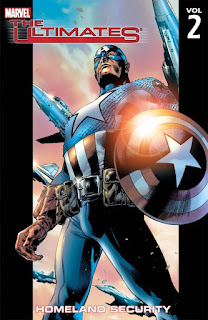Originally believed to have been defeated
during World War II, the invasive alien race known as the Chitauri is
discovered operating in secret on Earth. With an impending takeover on the
horizon, S.H.I.E.L.D. assembles the Ultimates to take care of the threat.
However, interpersonal drama and the Chitauri’s uncanny preparedness may prove
to be Earth’s mightiest heroes’ downfall.
The
Ultimates Volume 2: Homeland Security collects The Ultimates #7-13, written by Mark Millar and illustrated by
Bryan Hitch.
For fans of the Marvel Cinematic
Universe, Homeland Security will feel
familiar. This seven-part arc served as one of the primary sources of
inspiration for 2012’s ground-breaking Marvel’s
The Avengers. Both center on a S.H.I.E.L.D.-sponsored team of superheroes
forming to stop the invasion of the Chitauri, but they diverge wildly in their
execution. Marvel’s The Avengers was
a triumphant and exuberant film that celebrated heroism, no doubt drawing from
Marvel’s primary 616 universe than the more grounded Ultimate Universe. In
contrast, The Ultimates is joyless
and cynical. It’s filled with grim and inappropriate humour where its filmic
counterpart was more light-hearted. As with many of my other reviews of writer
Mark Millar’s work, the issue with this series comes down to a narrative that
never quite reaches its true potential due to faulty character work and eyeroll
worthy dialogue.
I think that the story itself for Homeland Security is actually really
interesting and engaging. I like the Chitauri as villains and the backstory
they’re given works well. I also find this universe’s version of the Avengers being
put together by S.H.I.E.L.D. to be a nice twist to the mythos. As such, the introductions
of Black Widow, Hawkeye, Scarlet Witch, and Quicksilver are much more
streamlined and comprehensible than their 616 counterparts’. What I don’t like
is just how poorly Millar treats the characters he has. For instance, when she’s
not being portrayed as the team’s resident markswoman, Black Widow’s sole
purpose in the narrative is to flirt with Iron Man. We get a great action
sequence early on where she jumps from a building and grabs onto a sniper rifle
that’s been dropped from a helicopter to save Hawkeye from an attack, but she’s
sidelined after that. Wasp gets a similar treatment. Even though there’s a very
brief action scene for her, Homeland
Security devotes her panel time to transitioning her from Giant Man’s love
interest to Captain America. There’s even an entire issue where Captain America
beats up Giant Man for having assaulted Wasp in the preceding arc. Even that
conflict is a fumbling mess since it seems like a typical man’s approach to trying
to resolving domestic violence – with more violence. There seems to be this
idea that readers are supposed to regard Captain America as some kind of
saviour for “defending Wasp’s honour” by bashing her abuser’s head in, but it’s
symptomatic of the bigger problem with Millar’s approach to the character. His
Cap’s solution to everything is to punch it. It’s absolutely exhausting. Let’s
also not forget the groan-inducing one-liner Cap spouts towards the end when he
says “You think this letter on my head stands for France?” This version
practically sweats toxic masculinity. There are also instances of homophobia,
like where Iron Man makes joke at the expense of Elton John and where Cap
employs homophobia as a means of getting the Hulk further enraged. Truthfully,
there’s very little that’s redeemable about Millar’s portrayal of these
characters. Why should anyone enjoy this comic when almost all the characters
are trash human beings?
Where I have a warmer opinion is Bryan
Hitch’s artwork. Though rough and inconsistent at times, he manages to maintain
a cinematic style that is energetic and appealing. One of his strong suits remains
his rendering of action sequences. Black Widow and Hawkeye’s takeover of a
Chitauri hive in New York City serves as an early example of how brilliantly
Hitch is able to deliver edge-of-your-seat action scenes. The smackdown between
Captain America and the Chitauri leader towards the end is another memorable
moment. Hitch also excels at telling a story through expressions and body
language. Towards the end of the arc, we get a scene where Wasp and Giant Man
have a conversation over the phone while the former is at a salon getting her
hair done. It’s tense even from just a visual standpoint. Another moment that
emphasizes Hitch’s body language skills is when Bruce Banner and Betty Ross
discuss the aftermath of the Hulk’s involvement in the Chitauri invasion. The
scene itself is actually quite unsettling since Betty basically admits to
finding the Hulk’s literal devouring of aliens to be a turn-on, but Hitch is
able to convey that even without Millar’s gross dialogue.
The
Ultimates is one of those frustrating books that should be great, but
sabotages itself due to poor characterization made by its creative team. It is
hopelessly trapped in a perpetual state of trying (and failing) to be hip and
edgy. It’s rife with tasteless jokes, riddled with homophobia, and doesn’t
respect its female characters. If we stripped away Millar’s dialogue, The Ultimates Volume 2: Homeland Security would
be stellar. Hitch’s artwork is really something to behold, his designs are some
of my favourites for these characters (across any universe), and we’ve got a
fantastic cast. Unfortunately, this arc crumbles under the weight of its toxic
masculinity and its significant misunderstanding of how its cast should be
portrayed.
RATING:
C-






No comments:
Post a Comment